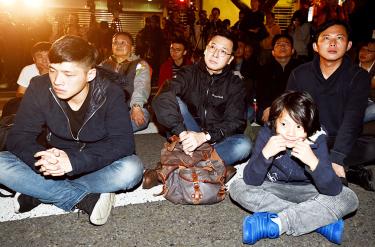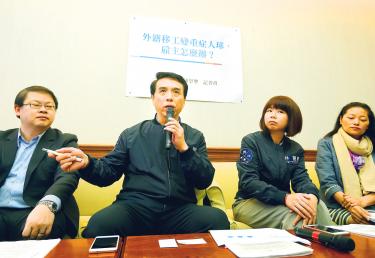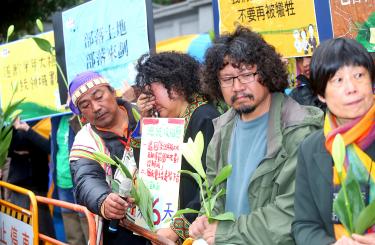Sunflower activists rally on three-year anniversary
By Abraham Gerber / Staff reporter
The Democratic Progressive Party (DPP) should swiftly pass supervisory articles requiring transparency and civic participation in any negotiations with China, protesters said yesterday at a rally commemorating the three-year anniversary of the Sunflower movement.
The Sunflower movement refers to student-led protests that began on March 18, 2014, in which students occupied the legislative chamber for almost 23 days to protest a trade in services agreement with China and how it was handled by the then-Chinese Nationalist Party (KMT) government.
More than 100 people gathered outside the Legislative Yuan for the commemoration.
“How many times have legislative committee meetings been held to review supervisory articles? Zero,” Restoration of Taiwan Social Justice convener Aman Wu (吳濬彥) said, leading the crowd in chanting “we want an answer” as to when the review would begin.
“The DPP has not been willing to put political capital behind the supervisory articles, but instead has been putting them on the back-burner,” said Taipei Society president Chiou Wen-tsong (邱文聰), who drafted the “civil society version” of the supervisory articles, the passage of which was a key demand of Sunflower activists.
Swift passage is crucial to create a framework before negotiations, he said.
“If we wait until China extends an olive branch, passage at that time will end up being read as a hostile gesture,” he said. “We have to make China give up unrealistic dreams and realize that unification will happen only on a democratic foundation.”
“The crucial issue is not whether the DPP would be willing to sell out, the issue is that they are likely to face enormous pressure from corporations and even the US,” Economic Democracy Union convener Lai Chung-chiang (賴中強) said.
“I once hoped that the DPP would realize its promise and we should give them more time. However, giving the party more time has not seen a sincere effort made on their part, it has been a series of broken promises and excuses,” Lin wrote on Facebook, questioning the sincerity of KMT Legislator William Tseng’s (曾銘宗) decision to initiate a review at the legislature’s Internal Administration Committee next week.
New Power Party Legislator Huang Kuo-chang (黃國昌) said his party would not support next week’s review, calling instead for cross-caucus negotiations to initiate a cross-committee review.
DPP spokesman Chang Chih-hao (張志豪) said that the party has included the supervisory articles in a list of priority legislation for the current legislative session.
The DPP caucus version represents the party and responds to the public’s demands, he said.
Additional reporting by Su Fang-ho


